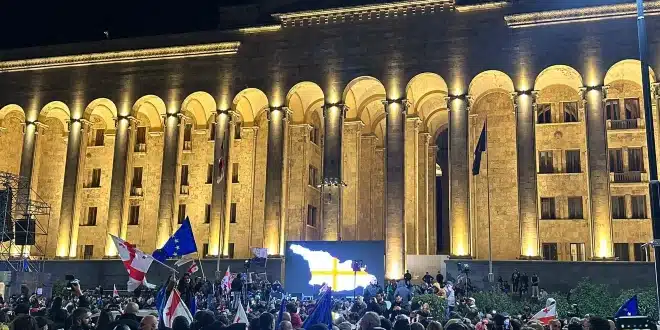This weekend, Georgia will see the appointment of a new president, although citizens won’t be casting their votes. The ruling Georgian Dream party has nominated Mikheil Kavelashvili, a former professional footballer who had a brief stint with Manchester City in the mid-1990s, as the sole candidate for the presidency. Opposition parties are boycotting the election, leaving Kavelashvili unchallenged.
Instead of a public vote, a 300-member electoral college comprising parliament members and local council representatives will decide Kavelashvili’s fate in a session in Tbilisi. This electoral change, instituted in 2017 by Georgian Dream, was pushed through their parliamentary majority.
The election takes place amid significant political unrest, with pro-EU opposition groups protesting against the Georgian Dream government, which is perceived as increasingly aligned with Russia and authoritarian in its governance. Critics argue that the government is steering Georgia towards autocracy, jeopardizing its aspirations to join the European Union.
The indirect presidential election follows a contentious parliamentary election in October, which opposition parties claim was rigged. Protests have erupted over the past two weeks after Georgian Dream announced it was postponing EU accession talks until 2028, leading to clashes between police and demonstrators, and resulting in over 400 arrests. Independent journalists have been attacked, and 150 police officers injured during the unrest.
Levan Tsutskiridze, an opposition leader from the Strong Georgia coalition, highlighted the defiance and persistence among protestors, emphasizing the fight to preserve Georgian democracy and its pro-EU stance. Elected MPs from Strong Georgia, along with other pro-EU parties, have boycotted parliament since the disputed election.
The electoral commission declared Georgian Dream the winner with 54% of the vote, a result the opposition deems fraudulent. The EU has called for an investigation into the alleged voting irregularities and the European Parliament has suggested a re-run of the election. Georgian Dream, however, maintains the election was fair, securing 89 out of 150 parliamentary seats. With no opposition MPs seated, the parliament is now predominantly composed of Georgian Dream members and a few allied populists.
Georgian Dream’s election campaign did not disclose plans to halt EU talks, despite using EU symbols in its branding. The party has increasingly adopted anti-Western rhetoric and implemented conservative policies, including a law banning same-sex marriage and adoption by same-sex couples. Critics accuse the government of consolidating control over regulatory institutions and promoting traditionalist agendas.
International reactions to the political situation in Georgia include the US State Department’s decision to limit visas for 20 Georgian officials for undermining democracy. The EU is considering similar sanctions. Bidzina Ivanishvili, Georgian Dream’s billionaire founder, has vaguely referenced a “Global War Party” in the West seeking to drag Georgia into conflict with Russia.
Large-scale pro-EU protests also occurred in May when the government introduced a “foreign agent” law, requiring organizations with significant foreign funding to register as foreign agents.
Current President Salome Zourabichvili has not accepted the electoral commission’s declaration of a Georgian Dream victory and has joined the protests against halting EU talks. Opposition parties continue to recognize her as the legitimate president.
Hans Gutbrod, a policy research professor at Ilia State University, described Georgia as facing one of its most profound crises, questioning Georgian Dream’s ability to govern effectively. The indirect presidential vote is expected to intensify the political turmoil, with Kavelashvili, who founded a hardline, anti-Western party in 2022, unlikely to bridge the political divide.
The protests in Tbilisi, though not forming a permanent encampment like Ukraine’s Maidan in 2013, continue nightly. The new president will be inaugurated on December 29, but Zourabichvili’s refusal to step down portends a deepening constitutional crisis. Tsutskiridze emphasizes that the opposition is prepared for a prolonged struggle to protect Georgia’s democratic and pro-EU future.
 The Daily Star Ireland
The Daily Star Ireland

